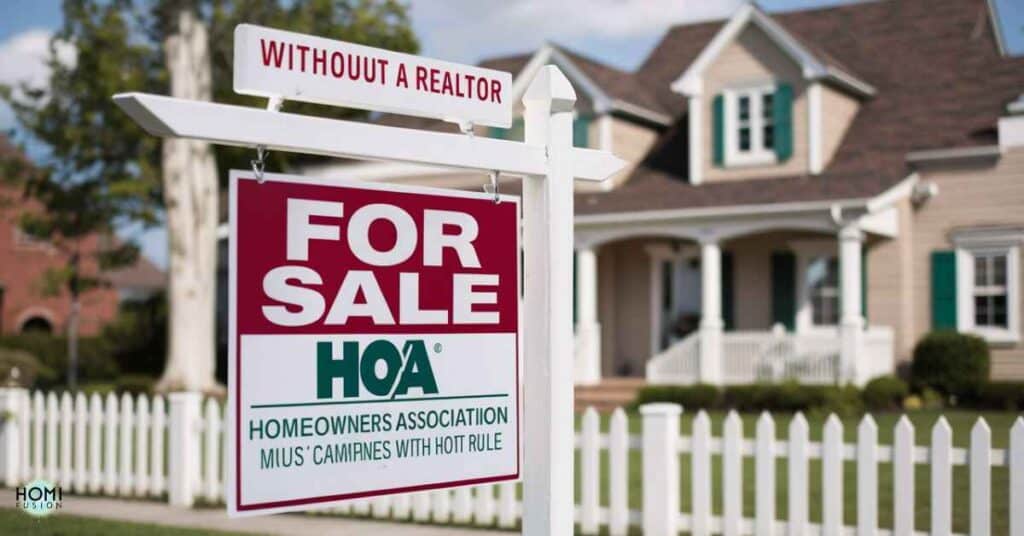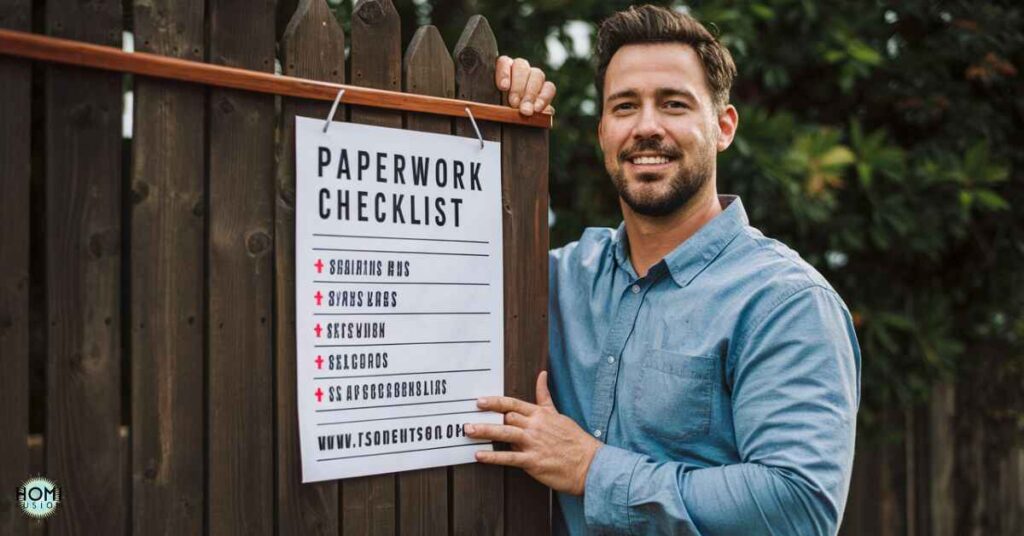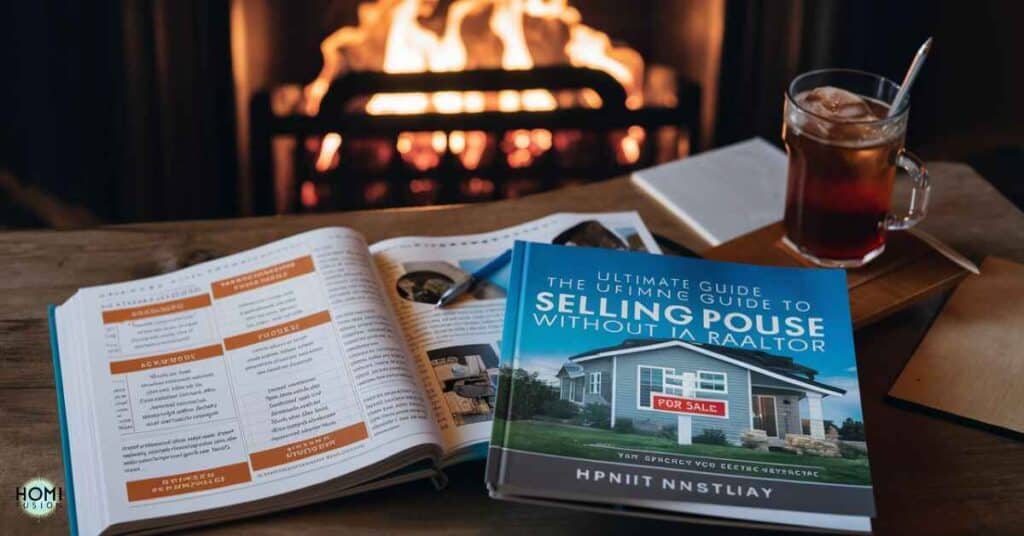Selling a house without the assistance of a realtor, also known as a “for sale by owner” (FSBO) transaction, can be a daunting task for many homeowners. However, with the right knowledge and preparation, it can also be a cost-effective and rewarding experience.
In this comprehensive guide, we’ll explore the paperwork you need and the advantages and disadvantages of selling a house without a realtor. We’ll also provide you with a detailed checklist to ensure a smooth transaction.
Why Do Some Sellers Avoid Working With a Realtor?
There are several reasons why some homeowners choose to sell their property without the help of a real estate agent:
- Cost Savings: Realtors typically charge a commission of around 5-6% of the home’s sale price. By avoiding this commission, sellers can potentially save thousands of dollars.
- Control over the Process: Selling a house without a realtor allows the seller to have complete control over the marketing, pricing and negotiation process.
- Privacy and Flexibility: Some sellers prefer to handle the sale independently. It provides more privacy and flexibility in scheduling showings and negotiating with potential buyers.
- Belief in Their Ability: Some homeowners believe they have the necessary knowledge and skills to successfully market and sell their property without professional assistance.
Selling a house without a realtor can be more time-consuming and challenging. The homeowner assumes all responsibilities typically handled by a real estate professional.
The Importance of Paperwork When Selling a Home

Selling a house involves a significant amount of paperwork, regardless of whether you work with a realtor or not. Properly handling these documents is crucial to ensure a smooth and legally compliant transaction. Failure to do so can result in delays, legal issues or even the termination of the sale.
What does “sell by owner” mean?
“Sell by owner,” also known as “for sale by owner” (FSBO), refers to the process of selling a home without the assistance of a real estate agent or realtor. In an FSBO transaction, the homeowner is responsible for all aspects of the sale. This includes marketing, showing the property, negotiating with buyers, and handling the necessary paperwork.
The Most Common Paperwork For Selling A House By Owner
When selling a house without a realtor, there is a significant amount of paperwork involved. Here are some of the most common documents you’ll need:
Original Sales Contract
The sales contract is a legally binding agreement between the buyer and seller, outlining the terms and conditions of the sale. It should include details such as the purchase price, closing date, contingencies and any agreed-upon repairs or credits.
Residential Property Disclosure Form
In most states, sellers are required to provide a residential property disclosure form, which outlines any known defects or issues with the property. This form helps protect both the buyer and seller from potential legal disputes.
Purchase Agreement
The purchase agreement is a comprehensive document that includes details about the property, the buyer and seller, the purchase price, the closing date and any contingencies or special conditions related to the sale.
Title Reports and Deed
A title report is a document that outlines the legal ownership of the property, as well as any liens, encumbrances, or other issues that may affect the transfer of ownership. The deed is the legal document that transfers ownership from the seller to the buyer.
Loan Documents
If the buyer is financing the purchase, you’ll need to provide them with necessary loan documents. These may include mortgage statements, payoff quotes and information about the existing loan on the property.
Latest Utility and Property Tax Bills
Buyers will want to see the most recent utility bills (water, electricity, gas) and property tax statements to understand the ongoing costs associated with the property.
Homeowners Association (HOA) Agreements and Rules
If the property is part of a homeowner’s association (HOA), you’ll need to provide copies of the HOA agreements, rules and any associated fees or dues.

Plans and Permits
If you’ve made any renovations or additions to the property, you’ll need to provide copies of the approved plans and permits from the local authorities.
Receipts and Warranties
Gather any receipts and warranties for major appliances, systems or other components of the home. This information can be valuable for the new buyer.
Property Survey
A property survey is a detailed map of the property boundaries, structures and any easements or encroachments that may exist.
Mortgage Statements
If you have an existing mortgage on the property, you’ll need to provide the most recent mortgage statements to the buyer.
Certificate of Occupancy
In some areas, a certificate of occupancy may be required to confirm that the property meets local building codes and is safe for occupancy.
Your Home’s Deed
The deed is the legal document that proves ownership of the property. You’ll need to provide the original deed to the buyer at closing.
A Disclosure Statement
In many states, sellers are required to provide a disclosure statement that outlines any known defects or issues with the property. This helps protect both parties from potential legal disputes.
Sales Contract
The sales contract is a legally binding agreement between the buyer and seller. It outlines the terms and conditions of the sale, including the purchase price, closing date, contingencies, and any agreed-upon repairs or credits.
Miscellaneous Documents
Depending on the specific circumstances of your sale, you may need additional documents, such as lead-based paint disclosures, septic system permits, or well water tests.
It’s essential to gather and organize all necessary paperwork before listing your home for sale. This will help ensure a smoother transaction and minimize potential delays or legal issues.
Read this blog: What Is The Value Of My Mobile Home?
The pros and cons of selling a house by owner
Selling a house without the assistance of a realtor can have both advantages and disadvantages. Let’s explore some of the key pros and cons:
Pros
- Cost Savings: By avoiding a realtor’s commission, which can range from 5-6% of the sale price, you can potentially save thousands of dollars.
- Control over the Process: As the seller, you have complete control over the marketing, pricing, and negotiation strategies.
- Flexibility: You can schedule showings and open houses at times that are convenient for you.
- Direct Communication: You can communicate directly with potential buyers, allowing you to build a personal connection and address their concerns or questions more effectively.
- Negotiation Power: Without a realtor, you can negotiate directly with buyers, giving you more control over the terms of the sale.
Cons
- Time and Effort: Selling a house without a realtor requires a significant investment of time and effort in tasks such as marketing, showing the property, and handling paperwork.
- Lack of Expertise: Realtors have extensive knowledge of the local real estate market, pricing strategies, and legal requirements, which can be challenging for an inexperienced seller to navigate.
- Emotional Involvement: As the homeowner, you may have an emotional attachment to the property, making it difficult to remain objective during negotiations.
- Limited Exposure: Without the assistance of a realtor, your property may not receive the same level of exposure to potential buyers through the Multiple Listing Service (MLS) and other real estate marketing channels.
- Legal Risks: Navigating the legal complexities of a real estate transaction can be challenging, and mistakes can lead to potential legal issues or disputes.
Before deciding to sell a house without a realtor, it’s crucial to carefully weigh the pros and cons. Assess your ability to handle the responsibilities involved in the process.
Paperwork Checklist for Sellers

To ensure a smooth and successful FSBO transaction, it’s essential to have all the necessary paperwork in order. Here’s a comprehensive checklist to help you stay organized:
- Original Sales Contract
- Residential Property Disclosure Form
- Purchase Agreement
- Title Reports and Deed
- Loan Documents (mortgage statements, payoff quotes, etc.)
- Latest Utility and Property Tax Bills
- Homeowners Association (HOA) Agreements and Rules
- Plans and Permits for Renovations or Additions
- Receipts and Warranties for Major Appliances and Systems
- Property Survey
- Mortgage Statements
- Certificate of Occupancy (if required in your area)
- Your Home’s Deed
- Disclosure Statement
- Lead-based Paint Disclosures (if applicable)
- Septic System Permits or Well Water Tests (if applicable)
- Any Other Relevant Documents or Disclosures
It’s crucial to gather and review all necessary documents before listing your home for sale. Ensuring you have everything in order will help you avoid potential delays or legal issues during the transaction.
Paperwork Exceptions
The checklist provided covers the most common documents for an FSBO transaction. However, there may be exceptions or additional paperwork needed based on your specific situation and location. For example, in some states or municipalities, you may need to provide additional disclosures or obtain specific permits or approvals.
It’s essential to research the local laws and regulations governing real estate transactions in your area to ensure you have all the necessary paperwork in order. Consulting with a real estate attorney or local authorities can be helpful in determining if any additional documentation is required.
Buyers Will Still Want to Complete the Inspection Process
Even when selling a house without a realtor, potential buyers will still want to have the property inspected by a professional home inspector. This inspection is crucial for identifying any potential issues or defects with the property that may not be immediately apparent.
As the seller, you should be ready to accommodate buyers’ requests for inspections. Provide them with any relevant documentation or information about the property’s condition and maintenance history.
Being transparent about any known issues or defects is crucial. Failing to disclose such information could result in legal disputes or the termination of the sale.
The Home Inspection Process
The home inspection process typically involves the following steps:

- Hiring an Inspector: The buyer will hire a licensed and experienced home inspector to conduct a thorough evaluation of the property.
- Inspection Scope: The inspection will cover various aspects of the home, including the structural components, electrical and plumbing systems, appliances, roof, foundation and more.
- Inspection Report: After the inspection, the buyer will receive a detailed report outlining any issues or defects found, along with recommendations for repairs or further evaluation.
- Negotiation and Repairs: The buyer may request certain repairs based on the inspection report. They may also negotiate a credit or price reduction to cover the cost of repairs.
- Follow-up Inspections: In some cases, additional inspections may be required, such as a pest inspection, radon test or other specialized evaluations.
As the seller, it’s in your best interest to be cooperative and accommodating throughout the inspection process. Addressing any legitimate concerns raised by the inspection can help build trust with the buyer and facilitate a smoother transaction.
Case Study: Successful FSBO Home Sale
To illustrate the potential for a successful FSBO transaction, let’s examine a real-life case study:
The Sellers: John and Sarah, a married couple in their early 40s
John and Sarah had lived in their three-bedroom, two-bathroom home for over a decade. After carefully considering their options, they decided to sell the property without the assistance of a realtor, primarily to save on the commission fees.
Preparation and Marketing:
- Pricing Strategy: John and Sarah researched recent comparable sales in their neighborhood. They priced their home competitively but slightly below market value to attract more interest.
- Home Improvements: They invested in minor updates and repairs to enhance the property’s appeal, such as fresh paint, landscaping and decluttering.
- Marketing Efforts: They created an engaging online listing with high-quality photographs, detailed property descriptions, and virtual tours. They also utilized social media platforms and local advertising to reach potential buyers.
The Transaction Process:
- Screening Buyers: John and Sarah carefully screened potential buyers, ensuring they were pre-approved for financing and serious about purchasing the property.
- Negotiations: They handled negotiations directly with interested buyers, leveraging their knowledge of the local market and the property’s unique selling points.
- Paperwork and Legal Assistance: John and Sarah handled much of the paperwork themselves. However, they sought the guidance of a real estate attorney to review contracts and ensure compliance with local regulations.
- Home Inspection and Closing: They accommodated the buyer’s request for a professional home inspection and promptly addressed any concerns raised in the report. The closing process went smoothly, with John and Sarah saving approximately $18,000 by avoiding realtor commissions.
The Outcome:
John and Sarah achieved their desired sale price and saved a significant amount of money by handling the transaction themselves. They successfully sold their home within three months of listing it. Their diligent preparation, effective marketing strategies, and willingness to seek legal assistance when needed contributed to a positive FSBO experience.
This case study demonstrates that with dedication and research, selling a house without a realtor can be viable. It can also be a rewarding option for motivated sellers willing to navigate the process.
Quotes from Experienced FSBO Sellers
To provide additional insights and perspectives, here are some quotes from experienced FSBO sellers:
Selling my home without a realtor was a lot of work, but it was worth it in the end. I saved over $20,000 in commission fees, which I put towards renovations in my new home. – Mark, a recent FSBO seller in California
The biggest challenge was understanding all the legal paperwork and disclosures required. I hired a real estate attorney to review everything, which gave me peace of mind. – Emily, an FSBO seller in Texas
I was hesitant at first, but after doing my research and preparing extensively, I felt confident in handling the sale myself. It was empowering to have control over the entire process. – David, an FSBO seller in New York
Flexibility was a major advantage for me. I could schedule showings and open houses around my work schedule, which wouldn’t have been as easy with a realtor. – Sarah, an FSBO seller in Florida
These quotes highlight the potential benefits of selling a house without a realtor, such as cost savings, control over the process, and flexibility. However, they also emphasize the importance of preparation, understanding legal requirements and seeking professional assistance when needed.
Also read: What Is A Coach House?
Expert Tips for a Successful FSBO Transaction
To increase your chances of success when selling a house without a realtor, consider the following expert tips:

- Conduct Thorough Market Research: Invest time in researching recent comparable sales in your area, analyzing pricing trends, and understanding the current market conditions. This knowledge will help you price your home competitively and make informed decisions throughout the process.
- Prepare Your Home for Sale: Make necessary repairs, updates, and improvements to enhance your property’s appeal and address any potential issues that may arise during the inspection process. Staging your home and ensuring it is clean and well-presented can also positively impact buyer perception.
- Invest in Professional Photography and Marketing: High-quality listing photographs and virtual tours can significantly impact your marketing efforts and attract more potential buyers. Consider hiring a professional photographer and leveraging online platforms, social media, and local advertising to maximize exposure.
- Be Responsive and Accommodating: Promptly respond to inquiries from potential buyers and be flexible in scheduling showings and open houses. Building positive relationships with interested parties can increase your chances of a successful sale.
- Seek Legal Assistance When Needed: While you can handle many aspects of the sale yourself, it’s advisable to consult with a real estate attorney or legal professional, especially when reviewing contracts, navigating complex legal requirements, or addressing potential disputes.
- Remain Objective and Professional: Separating your emotional attachment from the transaction can be challenging, but it’s essential to maintain objectivity and professionalism throughout the process.
- Be Patient and Persistent: Selling a house without a realtor can take longer than a traditional sale, as you may have limited exposure and resources compared to a real estate professional. Remain patient, persistent and adaptable throughout the process, adjusting your strategies as needed.
Frequently asked questions
What paperwork do I need to sell my house in the UK?
To sell your house in the UK, you typically need an Energy Performance Certificate (EPC) and a completed Property Information Form (TA6).
How to sell a house without a realtor in Ohio?
In Ohio, you can sell your house without a realtor by pricing it competitively and marketing it effectively online. Consider hiring a real estate attorney to handle legal aspects.
How to sell your own home in Texas?
To sell your own home in Texas, list it online or with a “For Sale by Owner” sign, and be prepared to negotiate offers directly with potential buyers.
How to sell a house without a realtor in Florida?
To sell a house without a realtor in Florida, you’ll need to price your home competitively and market it effectively online. Additionally, you’ll need to handle negotiations and paperwork directly with potential buyers or hire a real estate attorney for guidance.
Do you need a solicitor to sell a house privately UK?
Yes, it’s advisable to hire a solicitor for legal guidance. They ensure the sale process adheres to regulations.
What is a proof of sale in the UK?
A proof of sale in the UK is a document confirming the completion of a property transaction. It includes details such as the sale price and completion date.
Conclusion
Selling a house without the assistance of a realtor can be a rewarding and cost-effective option for motivated sellers. While it requires more time, effort, and responsibility, the potential savings on commission fees can be significant.
You can navigate the FSBO process with confidence by following the comprehensive paperwork checklist provided. Additionally, understand the pros and cons and seek professional guidance when needed. Remember to conduct thorough market research, prepare your home for sale, invest in professional marketing, and remain objective and patient throughout the transaction.
The decision to sell your house without a realtor should be based on your personal circumstances. Consider your comfort level with the process and your willingness to take on the additional responsibilities. With careful planning and execution, an FSBO sale can be a rewarding and successful endeavor.







